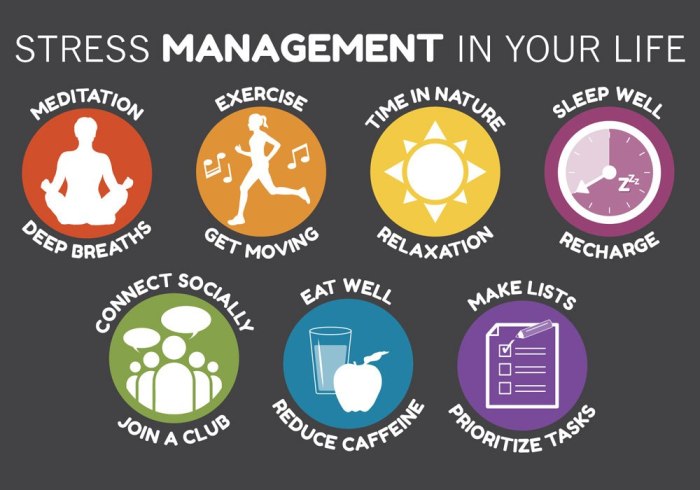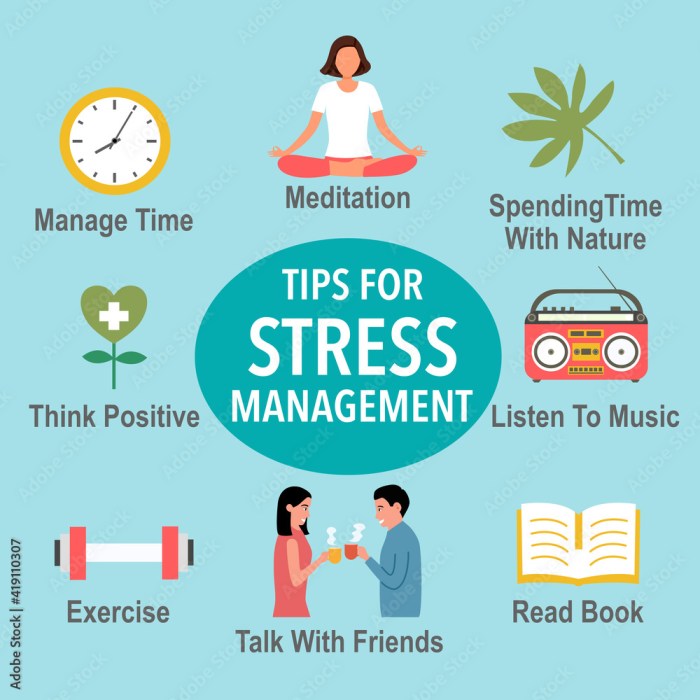Stress Management Tips takes center stage, inviting you into a world of well-being and productivity. Let’s dive into effective strategies to tackle stress head-on.
Unmanaged stress can wreak havoc on your mind and body, affecting everything from your health to your daily life. By understanding stress triggers and implementing healthy coping mechanisms, you can take charge of your well-being.
Importance of Stress Management

Feeling stressed out? Well, managing stress is crucial for keeping your mind and body in tip-top shape. Let’s break it down.
Stress can seriously mess with your health – both physically and mentally. From headaches and stomach issues to anxiety and depression, unmanaged stress can wreak havoc on your well-being.
But fear not! Effective stress management techniques can work wonders in improving your overall quality of life. By learning how to cope with stress, you can boost your productivity, enhance your mood, and ultimately lead a happier, healthier life.
Identifying Stress Triggers

Identifying stress triggers is crucial for effectively managing stress in daily life. By understanding what causes stress, individuals can develop strategies to cope with and reduce its impact on their overall well-being.
Common Stress Triggers
- Work-related issues such as deadlines, workload, or conflicts with colleagues.
- Financial concerns, including bills, debt, and unexpected expenses.
- Relationship problems with family, friends, or romantic partners.
- Health issues, either personal or affecting loved ones.
- Major life changes like moving, starting a new job, or going through a breakup.
Strategies to Identify Personal Stress Triggers
- Keep a stress journal to track situations, feelings, and reactions that trigger stress.
- Pay attention to physical cues such as muscle tension, headaches, or changes in appetite.
- Reflect on past stressful experiences and identify common themes or triggers.
- Seek feedback from trusted friends, family members, or a therapist to gain perspective.
Importance of Self-Awareness in Recognizing Stress Triggers
Self-awareness plays a key role in recognizing stress triggers as it helps individuals understand their own emotions, thoughts, and behaviors. By being more in tune with themselves, people can proactively identify and address potential stressors before they escalate. This self-awareness also allows for the development of personalized coping strategies that are tailored to individual needs, leading to more effective stress management in the long run.
Healthy Coping Mechanisms: Stress Management Tips
Stress is a part of life, but how we cope with it can make a significant difference in our overall well-being. Healthy coping mechanisms are essential to managing stress effectively and maintaining a balanced lifestyle. By incorporating these strategies into our daily routines, we can better navigate the challenges that come our way.
Short-term vs. Long-term Coping Strategies
Short-term coping strategies are typically immediate actions taken to address stress in the moment. This could include deep breathing exercises, taking a short walk, or talking to a friend. While these strategies provide quick relief, long-term coping mechanisms involve sustainable practices that help build resilience over time. Examples of long-term coping strategies may include regular exercise, mindfulness meditation, or seeking therapy.
Benefits of Incorporating Relaxation Techniques
Relaxation techniques, such as deep breathing, progressive muscle relaxation, or guided imagery, can help reduce stress levels and promote a sense of calm. By incorporating these techniques into our daily routines, we can proactively manage stress and prevent it from overwhelming us. Regular practice of relaxation techniques can also improve sleep quality, boost mood, and enhance overall well-being.
Time Management Techniques
Effective time management is crucial for reducing stress levels and improving productivity. By utilizing various strategies to prioritize tasks and set boundaries, you can create a more balanced and manageable schedule.
Utilize a To-Do List
- Start each day by creating a list of tasks that need to be completed.
- Break down larger tasks into smaller, more manageable steps.
- Prioritize tasks based on deadlines and importance.
Avoid Multitasking
- Focus on one task at a time to ensure quality and efficiency.
- Avoid distractions and set aside dedicated time for each task.
- Switching between multiple tasks can lead to increased stress and decreased productivity.
Set Realistic Goals
- Break down long-term goals into smaller, achievable milestones.
- Set specific, measurable, attainable, relevant, and time-bound (SMART) goals.
- Celebrate small victories along the way to stay motivated.
Establish Boundaries, Stress Management Tips
- Learn to say no to tasks or commitments that do not align with your priorities.
- Set specific work hours and avoid overextending yourself.
- Create a balance between work and personal life to avoid burnout.